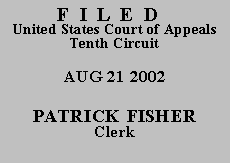

| UNITED STATES OF AMERICA, |
|
| v. | |
| MARION A. ROWE, |
argument. See Fed. R. App. P. 34(f); 10th Cir. R. 4.1(G). The case is therefore submitted without oral argument.
Defendant contends that (1) his two convictions under 18 U.S.C. § 922(g) for possession of a single firearm subjected him to double jeopardy, and (2) the district court's sentencing determination that the gun was "stolen" was not supported by sufficient evidence. We have jurisdiction under 28 U.S.C. § 1291, Fed. R. App. P. 4(b), and 18 U.S.C. § 3742(a). The government correctly concedes the double jeopardy claim. We affirm the finding that the gun was "stolen."
On July 21, 2000, the Tulsa Police Department executed a search warrant at 1146 North Cheyenne Avenue. During the search an officer found a .45 caliber handgun loaded with four rounds of ammunition. Defendant was charged with possession of a firearm and ammunition after prior conviction of a felony, in violation of 18 U.S.C. § 922(g)(1), and possession of a firearm and ammunition while under a protective order, in violation of 18 U.S.C. § 922(g)(8). Both counts were based upon the single handgun found during the search.
A jury found Defendant guilty of both counts. At sentencing, Defendant objected to the application of United States Sentencing Guideline § 2K2.1(b)(4), which requires an increase of two offense levels if the firearm was "stolen."
The court used three sources of information to determine whether the gun was "stolen." The first source was a police report that described the "possible larceny" of the gun eventually recovered from 1146 North Cheyenne Avenue. According to the report, the owner of the gun had loaned it to his brother, who kept it at his girlfriend's home. But the brother could not find the gun the night before the owner filed the report, and the girlfriend thought it had been stolen.
The second source was testimony during a hearing on Defendant's request for appointment of alternate counsel. Defendant told the court that he knew the girlfriend "gave the gun to somebody" who, after shooting someone, arranged for the gun to be hidden at Defendant's home. Defendant claimed that the gun was hidden while he was out of town. Despite Defendant's acknowledgment that the girlfriend did not have permission to give the gun to anyone, he refused to use the term "stolen."
The third source was testimony at the sentencing hearing. The gun owner testified that he loaned the gun to his brother "for a week or two." When he asked for it back, however, he was told it had been stolen from the home of the brother's girlfriend. The brother testified that he had borrowed the gun from the owner and kept it in his girlfriend's house. After he discovered it missing, he asked her where it was. She seemed unconcerned. He speculated that she took it for herself or let someone else take it. He said that although he had given her permission to use the gun for her own safety, she had no right to dispose of it herself.
The district court found that the gun was "stolen" and applied the enhancement. It imposed concurrent sentences of 105 months on each count.
Although Defendant did not raise a double jeopardy objection at either trial or sentencing, we have held that a "double jeopardy claim, if established, would be plain error affecting the fairness of the district court proceedings." United States v. Contreras, 108 F.3d 1255, 1261 (10th Cir. 1997). The government concedes that Defendant is entitled to relief under United States v. Hooks, 33 Fed.Appx. 371, 2002 WL 126999 (10th Cir.), and United States v. Johnson, 130 F.3d 1420, 1426 (10th Cir. 1997). We agree. Accordingly, we REMAND with instructions to VACATE one of the two convictions.
B. Was the Gun "Stolen"?
Defendant contends that insufficient evidence supported the district court's finding that the gun was "stolen" within the meaning of USSG § 2K2.1(b)(4). We review the sentencing court's findings of fact for clear error, evaluating the "[e]vidence underlying a district court's sentence . . . and inferences drawn therefrom, in the light most favorable to the . . . court's determination." United States v. Conley, 131 F.3d 1387, 1389 (10th Cir. 1997).
USSG § 2K2.1(b)(4) provides: "If any firearm was stolen, . . . increase by 2 levels." "In the context of applying § 2K2.1(b)(4), this court has interpreted the term 'stolen' to mean all felonious takings . . . with intent to deprive the owner of the rights and benefits of ownership . . . ." United States v. Walters, 269 F.3d 1207, 1218 (10th Cir. 2001) (internal quotation marks and citations omitted). The essence of Defendant's argument is that the evidence does not establish an identifiable felonious taking. To be sure, the evidence did not establish the chain of custody of the gun from the owner's brother to Defendant. But it would be highly unlikely that everyone in the chain believed he or she had the right to possess it. "While it may be unclear who in this chain of possession first had the requisite intent to deprive [the owner] of the rights and benefits of ownership, it is indisputable that one or more of them did." Id. Thus, "the district court did not clearly err in finding that the gun was stolen." Id.
We AFFIRM the district court's sentencing determination. The sentence for Defendant's remaining conviction should not be disturbed.
Entered for the Court
Harris L Hartz
Circuit Judge
*.This order and judgment is not binding precedent, except under the doctrines of law of the case, res judicata, and collateral estoppel. The court generally disfavors the citation of orders and judgments; nevertheless, an order and judgment may be cited under the terms and conditions of 10th Cir. R. 36.3.